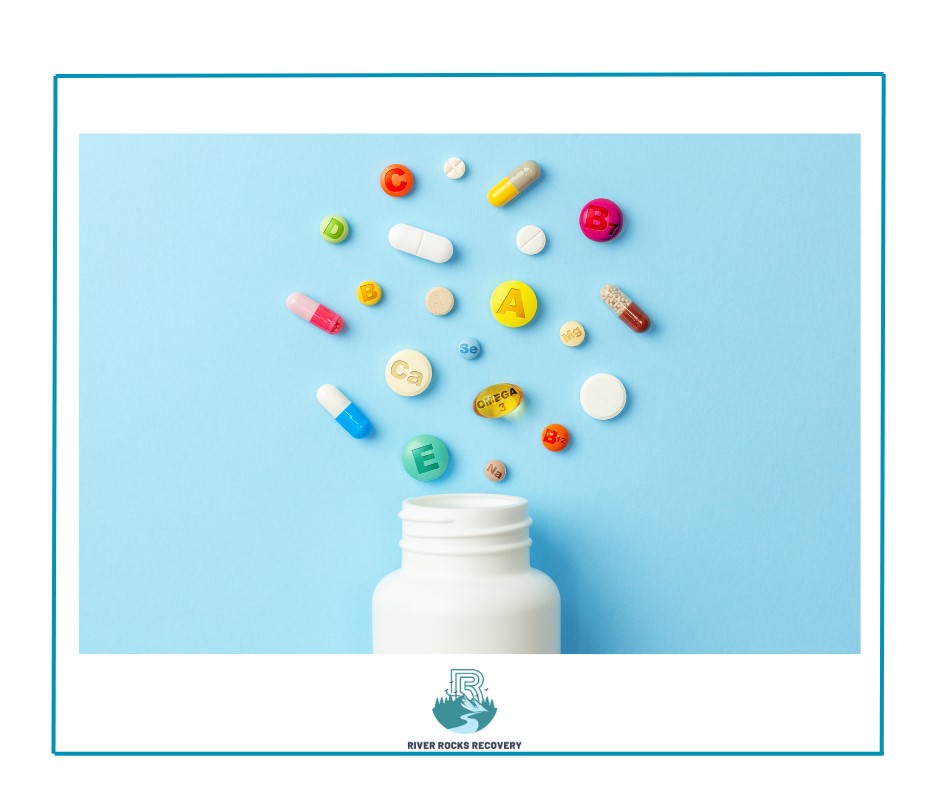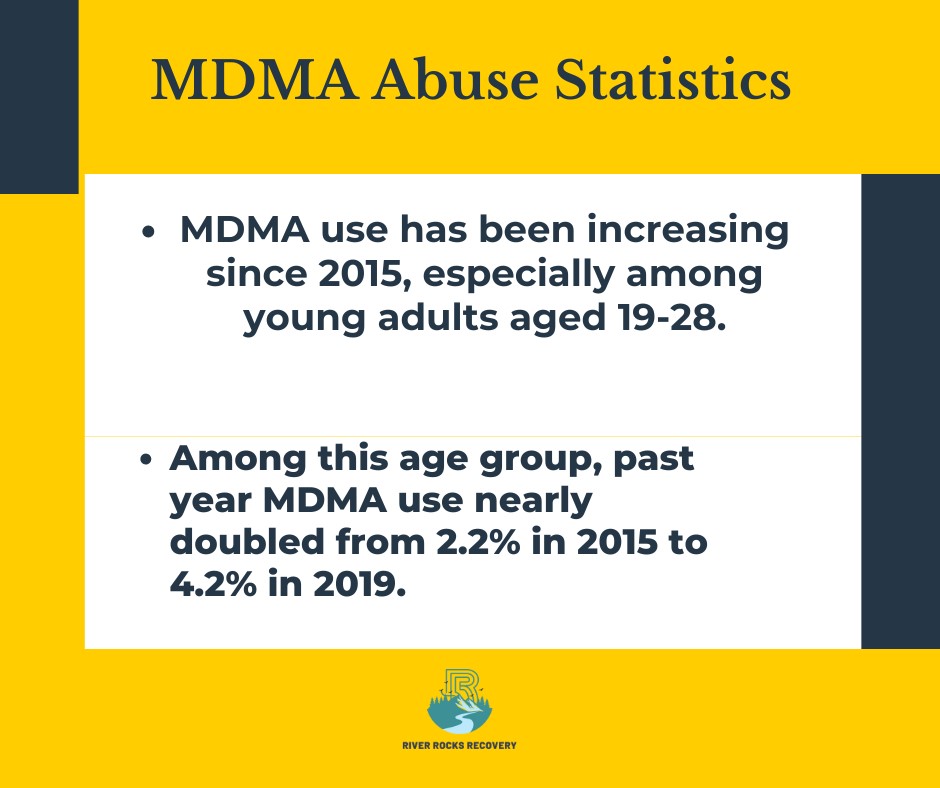You arrive at a party or club with friends, excited for a night of dancing and fun. Someone offers you a small, colorful pill called “molly” and says it will make you feel euphoric. While it may seem harmless, molly is the street name for MDMA– an illegal, dangerous drug. As you consider whether to take molly, remember the risks. Molly can cause serious health problems, even death. Make the smart choice and just say no. If you or a loved one are struggling with molly or other drug addiction, the caring professionals at River Rocks Recovery offer support and treatment options. Take the first step and contact us today at (888) 905-6281. The path to recovery starts here.
What Is MDMA?
MDMA is a synthetic drug that alters mood and perception. Commonly known as “molly,” this psychoactive substance acts as both a stimulant and hallucinogen.
Risks and Dangers
However, MDMA can cause a number of adverse health effects, including nausea, muscle cramping, involuntary teeth clenching, blurred vision, and increased heart rate and blood pressure. High doses may lead to hyperthermia, faintness, panic attacks, and in some cases, death. MDMA is an illegal, Schedule I controlled substance that has no accepted medical use and a high potential for abuse. Its use carries significant physical and psychological risks.
Combining With Other Substances
The effects are amplified and more hazardous when MDMA is combined with alcohol or other drugs. Addiction therapy treatment at River Rocks Recovery in Middletown, Ohio can help address substance abuse issues through evidence-based therapies.
How Does MDMA Work?
MDMA, is a synthetic drug that alters mood and perception. It works by increasing the activity of three brain chemicals:
- Dopamine – produces increased energy/activity
- Norepinephrine – raises blood pressure and heart rate
- Serotonin – affects mood, appetite, sleep, and pain
Effects on the Brain
MDMA causes a surge in serotonin, resulting in feelings of emotional warmth, empathy and euphoria. However, by depleting the brain’s serotonin levels, it can also lead to confusion, depression, anxiety, and sleep problems for days after use.
Physical Effects
MDMA’s stimulant effects enable users to dance for extended periods. Side effects include muscle tension, nausea, blurred vision, faintness, and chills or sweating.
In high doses, MDMA can dangerously increase body temperature, heart rate, and blood pressure – potentially leading to kidney, cardiovascular or liver failure.
Molly and MDMA Addiction and Withdrawal
The Potent High
MDMA, known as “Molly,” produces an intense rush of euphoria and energy. However, its addictive qualities can spiral into dependency rapidly. Withdrawal symptoms like anxiety, depression, and disturbing “comedowns” make quitting unassisted extremely difficult. Consider these alarming statistics regarding MDMA abuse and usage:
- MDMA use has been increasing since 2015, especially among young adults aged 19-28.
- Among this age group, past year MDMA use nearly doubled from 2.2% in 2015 to 4.2% in 2019.
Physical & Mental Effects
Beyond its mood-altering effects, MDMA takes a heavy toll. Potential consequences range from memory loss and sleep issues to increased anxiety and panic attacks. Long-term risks include heart, kidney, and liver damage.
MDMA Treatment Options
Partial Hospitalization Program (PHP)
River Rocks Recovery offers a comprehensive partial hospitalization program (PHP) to help those struggling with addiction. This intensive outpatient treatment provides structured therapy and support during the day while allowing patients to return home at night.
Intensive Outpatient Program (IOP)
For those needing a step-down from inpatient care or requiring more flexibility, the intensive outpatient program (IOP) provides several hours of treatment per week. IOPs allow patients to live at home while receiving counseling, group therapy, and other recovery services.
Outpatient Therapy
River Rocks’ outpatient program is ideal for those who have completed a higher level of care or have a solid support system at home. Individual and group counseling sessions are tailored to each patient’s needs for maintaining sobriety.
Evidence-Based Therapies
The dedicated staff utilizes evidence-based approaches such as cognitive behavioral therapy (CBT), dialectical behavior therapy (DBT), and relapse prevention therapy. These techniques address the root causes of addiction while teaching coping strategies for long-term recovery.
Personalized Recovery Plans
Our experienced clinicians work closely with each client to develop an individualized treatment plan. This holistic approach addresses the physical, psychological, and social aspects of addiction for lasting recovery.
Conclusion
You now have a deeper understanding of the very real dangers of molly and MDMA. The risks are serious and even life-threatening. If you or a loved one are abusing these drugs, get help today. River Rocks Recovery offers evidence-based treatment with proven results. Our caring team provides personalized care through programs like PHP, IOP, outpatient services, CBT, DBT, counseling and more. Take the first step and contact us now at (888) 905-6281. With our compassionate support and effective treatment, you or your loved one can overcome addiction, heal and thrive. There is hope –make the call.
FAQ: Addiction Therapy and Relapse Prevention Therapy Offered at River Rocks Recovery
Comprehensive Addiction Treatment
At River Rocks Recovery, we understand the complex nature of addiction. Our evidence-based therapies address the physical, psychological, and behavioral aspects of substance use disorders. Our programs include:
- Cognitive Behavioral Therapy (CBT)
- Dialectical Behavior Therapy (DBT)
- Individual and Group Counseling
Relapse Prevention Strategies
Relapse is a common concern during recovery. Our specialized relapse prevention therapy equips clients with coping mechanisms and lifestyle changes to maintain sobriety long-term. We focus on:
- Identifying triggers and high-risk situations
- Developing healthier coping skills
- Building a strong support system
Continuum of Care
River Rocks Recovery offers a full continuum of care, ensuring a smooth transition through every stage of recovery. Our programs include Partial Hospitalization (PHP), Intensive Outpatient (IOP), and Outpatient services, providing the level of support you need.





























